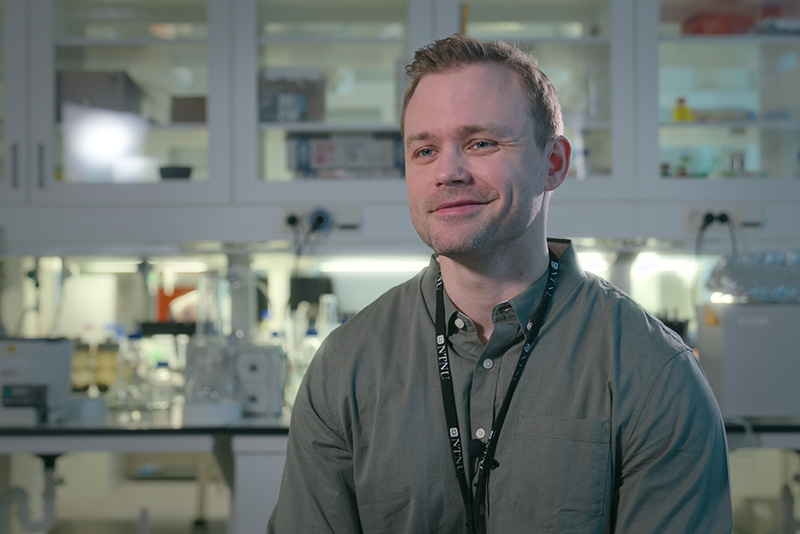Career opportunities - Biotechnology - Master's Programme
Career opportunities
A Masters degree in Biotechnology will give you a solid basis for further careers, both nationally and internationally.
University-trained personnel at the MSc level are needed and being employed both as researchers, advisors and consultants by
- Hospitals
- Health services/companies/agencies
- Environmental agencies
- Consultancy companies
- Industrial companies
Graduates of the Masters programme will be also be qualified for practical clinical work and technical executive positions in hospital laboratories as well as different positions in public and government institutions.
Completion of the MSc degree is a qualification for study at PhD level at NTNU or other norwegian or international universities.
Student interviews

With a passion for research
There are few things as inspiring and motivating as personal experience. Joachim Kjesbu
learned this at a young age. At 19, he was diagnosed with type 1 diabetes. In his search for a
solution, he came across something called alginate capsules at NTNU, which ignited a passion
that has driven him ever since.
Position: Postdoctoral Fellow, NTNU Institute for Biotechnology and Food Science
Highest education: Ph.D in Biotechnology from NTNU. Title: "Hydrogel beads from marine
polysaccharides: Investigation of bead formulations for use in cell encapsulation."
What do you work on?
- My work is about something called cell encapsulation. Cell encapsulation is a technique we
use to protect cells from the immune system. The idea is that we can provide therapeutic
treatment with these cells. By protecting them from the immune system, they can continue to
deliver therapeutic products, such as insulin for the treatment of type 1 diabetes.
Why cell encapsulation?
- I had a special interest in writing about cell encapsulation. When I was 19, I got ill and kept
getting worse. It turned out I had type 1 diabetes. I looked up if there was a solution, but there
wasn’t. However, I found an article about alginate capsules being researched at NTNU, which
might help people in my situation in the future.
- At that time, I wasn't sure I'd make it to a Ph.D. It seemed far off, but I thought, "why not?"
and aimed for it. It was my interest in this issue that brought me here, even though I didn't
even know what alginate was at that time. My plan stuck, and now I hold a Ph.D.
How was your educational journey?
- I started on a different route than most students. Many go for an integrated master's degree,
but I started out with a bachelor's degree at OsloMET as a bioengineer. This gave me a
professional title so I could work alongside my studies. Then, I pursued a master's degree in
biotechnology at NTNU and continued with a Ph.D in the same field.
- NTNU accommodated me well in my education. I received good support from my advisor
and had a great experience throughout the course. I was met with understanding when things
didn’t always go smoothly, which helped me a lot through the process.
International collaboration
- I had the chance to collaborate with other PhD candidates, especially on larger experiments
and articles where other colleagues contributed to the project. On one occasion, I traveled
with a colleague to the University of Illinois Chicago in connection with the capsule project.
Collaborating with the umbrella organization, Chicago Diabetes Project, we conducted a
research stay working on encapsulation experiments at CellTrans, experts in eye cell therapy.
This was incredibly valuable for my work.
Let your passion drive you
- If you're truly passionate about a subject or field, you should pursue a Ph.D. Not just for the
sake of the degree, but because you have genuine enthusiasm for something. That passion for
your field will assist you through the process. You'll face many challenges and uncertainties,
as you can never be sure if you'll achieve the results you expect. Your genuine engagement
and passion will be the engine that ultimately drives you over the finish line
Further studies
PhD
PhD
Watch PhD fellow Sofie Snipstad who works as a Postdoctoral fellow at our department of Physics and SINTEF department of biotechnology and nanomedicine.
Do you have passion for research?
If you want profound knowledge within one field of interest, maybe a PhD is something for you?
Paid education: With a MSc degree you can choose among the different PhD programmes offered by the Faculty of natural sciences and technology.
The PhD programmes educate independent scientists on an international level in cooperation with both national and international research environments.
